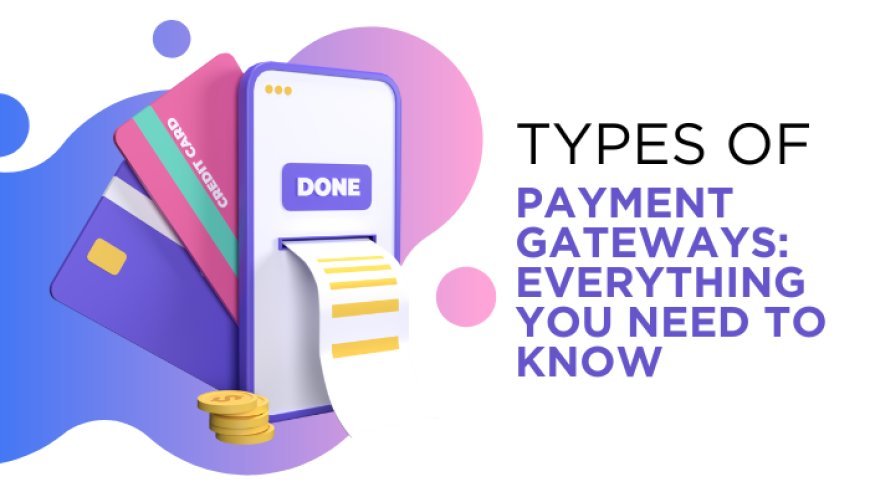Choosing the Right Types of Payment Gateway: A Strategic Guide for Digital Businesses

In today’s digital economy, enabling online payments is not just a convenience—it’s a fundamental requirement for business success. Whether you manage an eCommerce platform, a SaaS product, a subscription-based service, or a mobile application, the payment experience you offer can make or break customer trust and conversion rates.
At the core of a secure and seamless transaction lies the payment gateway—a crucial tool for any business that operates online. In this guide, we’ll break down what a payment gateway is, explore the main types of Payment Gateway , and help you identify the right fit for your business goals, technical capacity, and customer expectations.
What is a Payment Gateway?
A payment gateway is a software solution that enables businesses to process digital transactions through various channels—credit and debit cards, UPI, net banking, and digital wallets. It acts as a secure bridge between your customer’s payment method and your company’s bank account.
Its core functions include:
-
Authorization: Verifies payment credentials.
-
Security: Encrypts and safeguards sensitive data.
-
Processing: Transfers funds securely between parties.
In short, a payment gateway ensures that each transaction is accurate, safe, and seamless—building confidence for both the business and the customer.
???? Looking to build a custom solution? Our custom payment gateway development services are tailored to your industry-specific requirements, ensuring flexibility, compliance, and long-term scalability.
The Four Primary Types of Payment Gateways
Different payment gateway types cater to different business needs. Understanding their distinctions can help you make a more strategic decision.
1. Hosted Payment Gateways
With a hosted solution, the customer is redirected to the payment provider’s page to complete their transaction, then sent back to your site after payment confirmation.
Pros:
-
Easy to implement
-
Security and compliance managed by the provider
Cons:
-
Limited branding control
-
Redirects may disrupt the checkout experience
Best for: Startups and small businesses that need a plug-and-play solution with minimal technical effort.
2. Self-Hosted Payment Gateways
Payment details are collected on your website and securely forwarded to the gateway provider for processing.
Pros:
-
Better control over checkout design
-
Consistent branding throughout the transaction
Cons:
-
You’re responsible for data security and PCI-DSS compliance
Best for: Small to medium-sized businesses with in-house technical resources and a focus on user experience.
3. API-Hosted Payment Gateways (Integrated)
This option integrates payment capabilities directly into your site or app using APIs. Customers complete the transaction without being redirected.
Pros:
-
Seamless and fully branded checkout
-
High level of customization and control
Cons:
-
Requires advanced backend development
-
Compliance with strict security standards is essential
Best for: Large enterprises or tech-savvy businesses looking for a fully integrated solution.
4. Local Bank Integration Gateways
These gateways are connected directly to regional banks, allowing customers to complete transactions via their chosen bank’s interface.
Pros:
-
Familiar to local customers
-
Ideal for region-specific trust and compliance
Cons:
-
Not ideal for cross-border transactions
-
Limited features and flexibility
Best for: Businesses operating in a specific region or country.
Comparison Between Types of Payment Gateway
| Gateway Type | User Experience | Security | Customization | Ideal For |
|---|---|---|---|---|
| Hosted | Redirects to third party | High | Low | Startups, small businesses |
| Self-Hosted | Checkout on your site | Medium | Medium | SMEs with dev capabilities |
| API-Hosted (Integrated) | Fully integrated onsite | High | High | Tech-driven enterprises |
| Local Bank Integration | Redirects to bank portal | High | Low | Region-focused businesses |
How to Choose the Right Payment Gateway
Making the right choice involves understanding your unique business context. Consider the following factors:
1. Business Size and Maturity
Startups often benefit from hosted gateways due to ease of use. Larger companies with growing customer bases may need a customizable and scalable solution.
2. Technical Capabilities
If you lack in-house technical expertise, opt for solutions that handle compliance and maintenance. If you have a development team, consider self-hosted or API-based gateways for more flexibility.
3. Target Markets
For local operations, a region-specific gateway may suffice. For international business, choose a provider that supports multiple currencies and cross-border functionality.
4. Compliance & Security
Ensure that the gateway meets global standards like PCI-DSS, and offers features like tokenization, fraud detection, and encryption.
5. User Experience
A smooth, uninterrupted checkout process leads to higher conversions. Look for gateways that integrate seamlessly and reduce friction.
Why Your Choice Matters
The right payment gateway is a critical factor in your business’s success. Here’s what’s at stake:
-
Higher Conversion Rates: Fewer steps mean more completed purchases.
-
Improved Security: Protect sensitive information and reduce fraud risks.
-
Business Scalability: Add new features and expand into new markets with ease.
-
Payment Flexibility: Accept a wide variety of payment options including cards, UPI, wallets, and more.
Final Thoughts
Your payment gateway is not just backend infrastructure—it’s a core component of your customer experience and revenue strategy. From branding and UX to compliance and international capabilities, the right gateway enhances every aspect of your digital business.
By understanding the types of payment gateways and aligning them with your business objectives, you can build a payment infrastructure that’s secure, scalable, and conversion-optimized.
What's Your Reaction?

























































